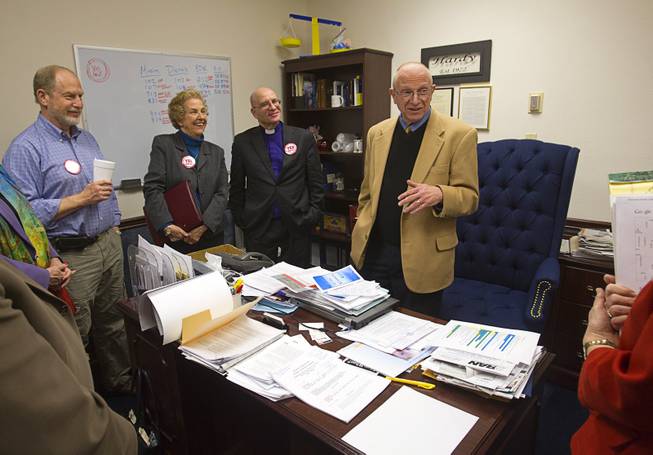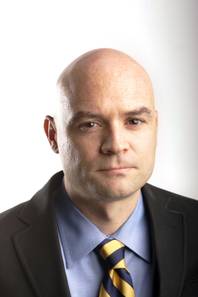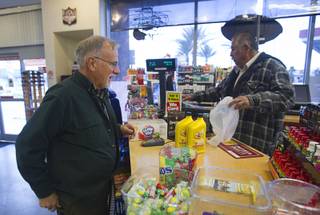
Senate Minority Whip Joe Hardy, center, talks with members of Nevadans for the Common Good in his office in Carson City on Monday, Feb. 11, 2013. The group, a coalition of faith-based organizations, is learning about the legislative process as members lobby for AB67, whch would strengthen the laws against sex traffickers.
Friday, Feb. 15, 2013 | 2 a.m.

J. Patrick Coolican
Before the Paulsens embark on their journey to influence the Nevada Legislature, David Paulsen says he needs to pick up a couple of quarts of oil for the 1994 Ford Econoline van. He bought it recently on eBay for $5,500 from a seller back East and drove to Nevada in a three-day sprint.
We have a long drive ahead of us, 450 miles to Carson City, so we start early and go north on the two-lane U.S. 95, passing one mountain range after another, the valley floor filled with sagebrush, the temperature dipping.
David and his wife, Barbara Paulsen, are part of a group of about 40 volunteers flying and driving to the state capital, where they will lobby the Legislature to toughen the state’s sex-trafficking laws. They want to make it easier to prosecute violent pimps and impose stiffer penalties while helping victims of the Las Vegas sex trade get treatment and whatever else they need to repair their lives.
Their campaign, in truth, shouldn’t be difficult to win. But this is their first time lobbying and is a good opportunity to test their mettle and prepare for future, more challenging, efforts.
The Paulsens are part of Nevadans for the Common Good, comprising members of nonprofit groups and churches, synagogues and mosques who grew tired of helplessly watching the community’s social dysfunction while the politicians dithered and the powers-that-be secretly cheered the status quo.
And so it begins with this trip to Carson City and the hard but necessary work if Nevada is going to be something other than what it is.
Barbara Paulsen organized the transport, arranging rides to and from the valley and the Reno airport to Carson City. I’m reminded of the civil rights activists who created a complex system of ride-sharing during the Montgomery bus boycott — great change requires these small but important tasks.
While David drives, Barbara Paulsen tells me how she wound up in this van, on this seven-hour drive. Her ancestors settled Belt, a small Montana town where she was raised. At the University of Montana in the 1960s, they gave her both the male and female aptitude tests to determine her career possibilities. That was a thing in those days.
On her way to becoming a dietitian, she was the only woman in a graduate course in analytical chemistry at the University of Missouri, but still somehow the professor could never get her name straight. On the upside, she met David in the class. They moved to Boulder City, where David was a chemist for the county’s water reclamation department, while Barbara worked on nutrition issues for the Dairy Council of Utah/Nevada. They raised three children, and now, in retirement, they think about the world they are leaving for their grandchild.
We stop at the Area 51 Alien Center. A sign commands, “Smoke 'em if you got 'em.”
• • •
Last spring at UNLV, Nevadans for the Common Good held a general membership rally, which drew more than 1,000 people. It was by turns boisterous celebration and solemn call to action. The idea is that Nevada’s business and labor elite have their megaphones and their lobbyists to whisper to elected officials, while the broader community remains voiceless.
Cynic that I am, I had dismissed the rally as another well-meaning but ultimately unsuccessful effort to move us from the top of all those bad lists we hear about that measure education and health care.
As it turns out, Nevadans for the Common Good has been quietly but diligently working, like an ant colony, and now it's ready to act.
The group hired Robert Hoo, a talented organizer who is a graduate of Yale University and its law school but chose this work instead of money.
He helped them form six geographic clusters and a leadership team that meets every two weeks. They coalesced around an issue — sex trafficking — about which there was broad consensus and a good shot at victory.
Hoo, who is riding with us, says this kind of work usually begins with stories — people talking about how they’ve been affected by failing schools or health care.
“Like Barbara’s story of her family settling the West, we all have these stories, even if they’re less dramatic, and it defines why we drive 450 miles to Carson City,” Hoo says.
He has his own story: He is the son of Chinese immigrants — his parents met in the immigration office in New York City in the mid-1960s. He traveled to China and learned about his father’s aunts and uncles, all brutally persecuted by the regime, imprisoned, executed, ruined.
Hoo says that at 15 or 16, living in a well-to-do New York City suburb, he realized the great sacrifices his family had made to give him a life of freedom from both subjugation and want. “I remember thinking, ‘I really need to do something with my life.’”
His yearning is shared by the others in the van. We arrive in Carson City as the sun sets. I head to a hotel while the Paulsens find the $38-per-day campground.
• • •
Monday morning, we meet at United Methodist Church of Carson City, one of the oldest buildings in Nevada.
We drink coffee in paper cups as people begin to arrive.
“We’re gonna stuff some folders — do you wanna give us a hand?” Hoo asks a volunteer.
Then it’s time for orientation, and he stands before about 65 volunteers — 25 Northern Nevadans have joined the 40 Nevadans for the Common Good who have made the pilgrimage from the south.
The group has arranged for a set of meetings with Attorney General Catherine Cortez Masto, who is pushing the sex-trafficking legislation, as well as a number of key legislators. They’ll be on the floor of the Assembly and Senate and introduced during the ceremonial part of the day’s session. Barbara Paulsen will give a short presentation to the Republican Assembly Caucus.
Nevadans for the Common Good, with Hoo’s prodding, has arrived at a key insight: While Nevada is usually run by a small crowd of powerful special interests, there are low barriers to entry. Constituents can meet with legislators fairly easily and, with their expertise, influence them.
The group has held 27 meetings with various legislators before the session even began, focusing smartly on the judiciary and money committees, where they’ll need allies.
Today, the volunteers — wearing buttons that read “Yes on AB67” — do a role-playing exercise with a minister acting in the the role of bombastic state senator so they can learn how to be most effective. It sounds cheesy, like an "Up with People" icebreaker, but it’s effective. The lessons: Be prepared by knowing the issue and the legislative proposal cold; let them know you are a constituent and represent a congregation of hundreds of families and thousands of members of Nevadans for the Common Good; suss out potential counter-arguments, interest group opposition and other political intelligence; be succinct; and follow up with a thank-you note and let them know you’re in this for the long haul.
Hoo gives them a pep talk: “Our object today is to be seen and heard, to demonstrate that we are a large and growing constituency and to make sure there is progress on this important legislation, to listen and hear concerns and pick up political intelligence. The conventional wisdom is that money and power — they’re the decision-makers. Today we want to make a small but important step to change that reality.”
At the Legislature, the group shows they’ve learned their lessons. They know the legislation, and they’re good at making succinct but compelling arguments — they offer examples of violent pimps who get released too quickly and go back to exploiting the same women.
In a meeting with state Sen. Joe Hardy, one is quick to note, “I’m in your district.”
Hardy brightens, “Bless your heart!”
With more than 1,000 bills offered over the course of the session, legislators usually don’t have time to read them all, so the activists summarize the sex-trafficking bill for them and answer questions.
Hardy is visibly impressed with their preparation and skills. “You’ve got more grass roots than grass!”
Before leaving, the group asks Hardy’s aide for updates on the bill’s progress and unexpected opposition.
There doesn’t seem to be any. There are no lobbyists for violent pimps.
The group acknowledges this, and more than once I hear the analogy of the prizefighter who must take on a few easy opponents — “tomato cans” — to learn the fight game and get his confidence up before taking on tougher opponents. It’s an apt analogy.
At the end of the day, they debrief, compiling intelligence on how legislators are reacting so far. They’re especially concerned about the bill’s fiscal note — any bill that costs money could die in the money committees.
They also have come to a stark conclusion: Republican Assemblyman John Hambrick, who is again advocating for sex-trafficking legislation after failing in 2011, may seem like a good ally, but he has drawbacks. He’s not well liked, especially by the Democratic majority.
They are already considering a Plan B in case Hambrick's best ideas die. It’s a sophisticated observation, and a correct one, after spending just eight hours in the building.
Before sending them home, their day of lobbying done, Hoo leaves them with this: “I think we learned you can have an impact by doing your homework, building relationships and being clear about your interests. We’re building something here. We may not have as much money as gaming or mining, but we’re organized, and we’re in it for the long haul, and we will have an impact.”
Once they win this battle, they’ll move on to the next issue: Quality of life for seniors in a community with an elderly suicide rate that is twice the national average. Another seemingly easy issue, but buried in there is a more thorny one — bolstering Southern Nevada’s paltry health care infrastructure, which will take money.
Let's hope farther on the horizon for Nevadans for the Common Good is the game-changer: education.
• • •
When the meeting wraps up, the sky is darkening and we head back to the van.
On the long drive home, somewhere north of Tonopah, the Paulsens remark that although they came of age in the 1960s, they were not politically active then.
“We aren’t reliving the idealism of youth,” Barbara Paulsen says.
Instead, they hope they’re living the wisdom of age.
They feel obligated to get involved now because “we feel much of this has happened on our watch,” David Paulsen says ruefully.
It’s after midnight when we return to the Las Vegas Valley. No doubt scores of young women are at work to pay off their pimps.


Join the Discussion:
Check this out for a full explanation of our conversion to the LiveFyre commenting system and instructions on how to sign up for an account.
Full comments policy